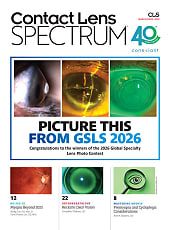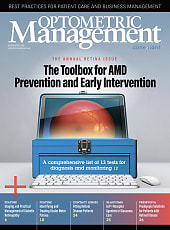Given that March is National Nutrition Awareness Month and many patients remain unaware of nutrition’s role in eye health, three optometrists offer tips on how to establish this link.
Laurie Capogna, OD, author of “Eyefoods, a Food Plan for Healthy Eyes,” who also practices in Niagra Falls, Ontario, says she personally asks her younger and older patients questions to establish this link.
“For younger children, I say, ‘You did great during your exam today! Now, let’s talk about how you can keep your eyes strong and healthy.’ Then, I explain that green vegetables are the best for their eyes, and I ask them to name some green vegetables to get their participation in the conversation,” she points out. “This engages parents as well, often leading to inquiries about how to get their children to eat more vegetables.”
Dr. Capogna says she asks older children (11 +) and adults, “Can you tell me what foods you think are good for your eyes?” She says that however they answer enables her to make the connection between nutrition and eye health because she either validates their answer with additional information or tells them which foods are best for their ocular health and why.
“I also review retinal imaging with my adult patients, so I can point out the optic nerve, blood vessels, and macula, and explain that the latter is responsible for 20/20 vision, in terms of reading and seeing faces,” Dr. Capogna explains. “From there, I tell them that there is a link between nutrition and the health of their macula, in that maculae that have greater amounts of certain nutrients have a lower risk for degeneration of the macula. From there, I educate them on the foods that are most abundant in these nutrients, such as leafy green vegetables, orange peppers, and eggs.”
Neda Gioia, OD, CNS, IFMCP, FOWNS, who practices in Shrewsbury, NJ, and is president and executive director of the Ocular Wellness & Nutrition Society, says she establishes the nutrition and eye health link on her practice’s patient intake form.
The form includes the question, “How many fruits and vegetables do you think you eat daily?”
“When a patient indicates these items are lacking in their diet, I dig a little further to find out what they do consume a lot of,” she explains. “This often leads to me replying with, ‘Did you know that sugar ages your eyes and can cause an eye condition called cataracts, which can cause vision loss?’ Connection made.”
Dorothy L. Hitchmoth, OD, FAAO, ABO, ABCMO DIPLOMATE, who practices in New London, NH, and is the Ocular Wellness & Nutrition Society’s treasurer, says she “keeps it simple.”
“I tell all my first-time patients that there are about 250 diseases of the body that can affect vision,” she explains. “Then, I ask them, ‘Do you want to know how to protect your eyes?’ Almost every patient says ‘yes.’ As ODs, it’s crucial we educate on the connection between nutrition and eye health. When a patient hears they could lose their vision due to a poor diet, that is often the wake up call they need to change their eating habits.” OM



